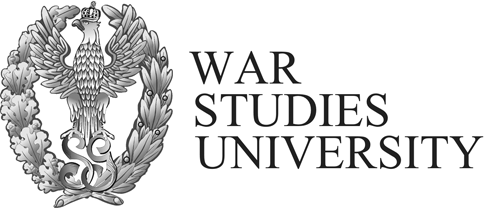Online first
Current issue
All issues
About
Aims and scope
Peer review process
Publication policy and ethics & malpractice statement
Editorial Board
Reviewers
Publisher
Guide for authors
Call for papers
Book Reviews
Special Issues Archive
New and emerging technologies in defence education, training and governance
Students of military classes concerning selected aspects of Poland’s national security. An empirical study
1
War Studies University, Warsaw, Poland
Publication date: 2017-12-31
Security and Defence Quarterly 2017;17(4):21-47
KEYWORDS
ABSTRACT
This article examines the opinions of students of military classes concerning aspects of
Poland’s national security. The main problem of the study is contained in the following
question: How do students of military classes describe selected conditions of Poland’s
national security? Thus, the objective of the article was to diagnose the opinions of students
of military classes about national security in Poland. The study involved an analysis of
the following aspects of Poland’s national security in the opinion of participating students
of military classes: social attitudes that are conducive to the strengthening of national
security, factors affecting national identity, and threats to national security. An analysis
of the results of the study also made it possible to determine the source of the respondents’
knowledge about national security. The article briefly looks at the origins of military classes and describes the research
methodology, and then presents a diagnosis of the opinions of students of military classes
about selected aspects of Poland’s national security: social attitudes conducive to the
strengthening of national security, factors shaping national identity, and threats to national
security. The sources of the respondents’ knowledge about national security are indicated
too. In the conclusion, answers to the research problems were provided and the need for
further studies of the matter in question was identified.
REFERENCES (9)
1.
Glińska, P., 2017. MON ma program dla klas mundurowych. Polska Zbrojna, 11 May 2017, [27 Oct 2017] http://www.polska-zbrojna.pl/h...- program-dla-klas-mundurowych
2.
Jakubowska U., 1993. Czynności badawcze w psychologii i pedagogice. Zarys problematyki. Wydawnictwo Uczelniane WSP, Bydgoszcz.
3.
Kanarski L., Koter M., Loranty K., and Urych I., 2016. Wstępna diagnoza funkcjonowania klas mundurowych – wyniki badań pilotażowych. In A. Skrabacz, I. Urych, L. Kanarski (eds), Klasy mundurowe. Od teorii do dobrych praktyk. Wydawnictwo Akademii Obrony Narodowej, Warsaw.
4.
Kanarski, L., Koter, M., and Urych, I., 2014. Wstęp do analizy funkcjonowania klas wojskowych po 1989 roku. In J. Walczak (ed.), Społeczny wymiar obronności. Stowarzyszenie Ruch Wspólnot Obronnych: MCOPY Paweł Żerański, Obryte; Warsaw.
5.
Skrabacz, A., Urych, I. and Kanarski, L. (eds), 2016. Klasy mundurowe. Od teorii do dobrych praktyk. Wydawnictwo Akademii Obrony Narodowej, Warsaw.
6.
Pilch T., Bauman T., 2001. Zasady badań pedagogicznych. Strategie ilościowe i jakościowe. Żak, Warsaw.
7.
Program nauczania dla szkół ponadgimnazjalnych przedmiotu “Edukacja wojskowa”, 2017. Warsaw.
9.
Urych I., 2016. Military class in Poland – experiences and perspectives. Security and Defence Quarterly, 2(11), 110-132. doi: 10.5604/01.3001.0010.5662.
CITATIONS (4):
1.
STUDENTS’ OPINIONS ABOUT THE SUBJECT OF SECURITY EDUCATION IN UPPER SECONDARY SCHOOLS
Barbara Drapikowska
Security and Defence Quarterly
Barbara Drapikowska
Security and Defence Quarterly
2.
TYPES OF SECURITY EDUCATION IN POLAND. SELECTED EXAMPLES
Marlena ZADOROŻNA
Security and Defence Quarterly
Marlena ZADOROŻNA
Security and Defence Quarterly
3.
Compulsory military service as a social integrator
Ronen Itsik
Security and Defence Quarterly
Ronen Itsik
Security and Defence Quarterly
4.
Students' opinion on the academic curriculum in military classes
Ilona Urych
Security and Defence Quarterly
Ilona Urych
Security and Defence Quarterly
Share
RELATED ARTICLE
We process personal data collected when visiting the website. The function of obtaining information about users and their behavior is carried out by voluntarily entered information in forms and saving cookies in end devices. Data, including cookies, are used to provide services, improve the user experience and to analyze the traffic in accordance with the Privacy policy. Data are also collected and processed by Google Analytics tool (more).
You can change cookies settings in your browser. Restricted use of cookies in the browser configuration may affect some functionalities of the website.
You can change cookies settings in your browser. Restricted use of cookies in the browser configuration may affect some functionalities of the website.




